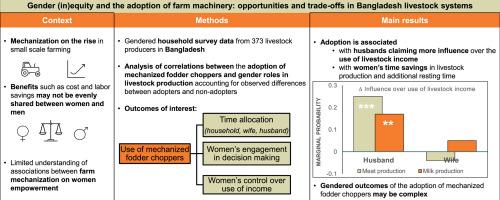性别平等与农业机械的采用:孟加拉国畜牧系统的机遇与权衡
IF 5.7
1区 社会学
Q1 GEOGRAPHY
引用次数: 0
摘要
农业机械化可以改善农业粮食系统的福祉和生计,但女性和男性可能无法平均分享其收益。鉴于在发展计划中对农业机械化的兴趣日益增加,这是一个令人担忧的问题。在这项研究中,我们分析了来自孟加拉国373家畜牧业生产者的数据,以评估采用机械化饲料切割机与性别时间分配、决策参与和牲畜收入控制之间的关系。考虑到已观察到的收养者和非收养者之间的异质性,我们发现机械化饲料直升机的使用与丈夫声称对牲畜收入的使用有更大的影响有关。收养还与妇女在畜牧生产中节省的时间有关,她们将这些时间用于额外的休息。虽然本研究中的关联不应被解释为因果关系,但我们得出结论,采用机械化饲料切碎机的性别结果可能是复杂的。推广农业机械的发展计划可能需要考虑如何让妇女获得利益,同时采取保障措施,防止妇女在畜牧业生产中的作用可能被削弱。本文章由计算机程序翻译,如有差异,请以英文原文为准。

Gender (in)equity and the adoption of farm machinery: Opportunities and trade-offs in Bangladesh livestock systems
Agricultural mechanization can improve wellbeing and livelihoods in agrifood systems, but its benefits may not be evenly shared between women and men. This is a concern given the increased interest in agricultural mechanization in development programs. In this study, we analyzed data from 373 livestock producers in Bangladesh to assess the associations between adopting mechanized fodder choppers and gendered time-allocation, participation in decision-making, and control over livestock income. Accounting for observed heterogeneity between adopters and non-adopters, we find that the use of mechanized fodder choppers was associated with husbands claiming more influence over the use of livestock income. Adoption was also correlated with women’s time savings in livestock production, which they used for additional resting. While the associations in this study should not be interpreted as causal relationships, we conclude that the gendered outcomes of the adoption of mechanized fodder choppers can be complex. Development programs promoting farm machinery may need to consider ways that allow women to capture benefits while employing safeguards to prevent a potential weakening of women’s agency in livestock production.
求助全文
通过发布文献求助,成功后即可免费获取论文全文。
去求助
来源期刊

Journal of Rural Studies
Multiple-
CiteScore
9.80
自引率
9.80%
发文量
286
期刊介绍:
The Journal of Rural Studies publishes research articles relating to such rural issues as society, demography, housing, employment, transport, services, land-use, recreation, agriculture and conservation. The focus is on those areas encompassing extensive land-use, with small-scale and diffuse settlement patterns and communities linked into the surrounding landscape and milieux. Particular emphasis will be given to aspects of planning policy and management. The journal is international and interdisciplinary in scope and content.
 求助内容:
求助内容: 应助结果提醒方式:
应助结果提醒方式:


